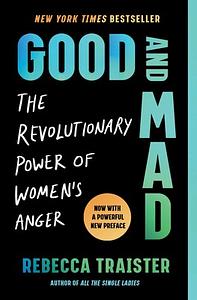Take a photo of a barcode or cover
challenging
emotional
hopeful
reflective
tense
medium-paced
The author says that she wrote it quickly to capture the moment and it reflects the joy and hope that many people had in the moment that this would bring about real change. Reading it years later after Trump has been elected again is kind of disappointing and shows that it seems to have been more of a flash in the pot than a prolonged movement. Should have taken time with it.
4.5 stars
I was not quite sure what to expect from this book - after all, a book about “women‘s anger” can treat a variety of topics and can do so in a lot of different ways. And I am still not quite sure how to describe what this book is - it is a very sharp political analysis of the 2016 US presidential election, a historical reflection on the role of rage in the first and second wave of feminism, a field report on women organisers and activists of grassroots movements, a call to action, an intelligent analysis of the #metoo movement, food for thought (quite a lot of it) and it is very well written. I would actually really recommend it to everyone who wants to better understand the current women’s movement in context with previous women’s movements and in light of (quite) recent political events or who just wants a confirmation that anger can indeed be productive and a force for good.
However, the perspective taken in this book is very American - and so it focuses on American women and their issues. I know that it was written for an American audience, but nevertheless, I sometimes would have liked a more international perspective - especially as some of the discussed phenomena were and are relevant and happening world wide.
Still, Rebecca Traister’s political analysis is on point, her writing is very engaging and intelligent and I learned a lot reading this book :).
I was not quite sure what to expect from this book - after all, a book about “women‘s anger” can treat a variety of topics and can do so in a lot of different ways. And I am still not quite sure how to describe what this book is - it is a very sharp political analysis of the 2016 US presidential election, a historical reflection on the role of rage in the first and second wave of feminism, a field report on women organisers and activists of grassroots movements, a call to action, an intelligent analysis of the #metoo movement, food for thought (quite a lot of it) and it is very well written. I would actually really recommend it to everyone who wants to better understand the current women’s movement in context with previous women’s movements and in light of (quite) recent political events or who just wants a confirmation that anger can indeed be productive and a force for good.
However, the perspective taken in this book is very American - and so it focuses on American women and their issues. I know that it was written for an American audience, but nevertheless, I sometimes would have liked a more international perspective - especially as some of the discussed phenomena were and are relevant and happening world wide.
Still, Rebecca Traister’s political analysis is on point, her writing is very engaging and intelligent and I learned a lot reading this book :).
Yep. This took me almost 1 year to finish. It is that dense! I actually think this could be a textbook for at least a semester-long college course in part on the history of the Women’s Movement and in part on the awakening of white women in the 21st century. I was pissed. I was proud. I was humbled. I have hope.
Susan B Anthony and Frederick Douglass as besties is one of my favorite things from history next to how much Martha Washington despised Thomas Jefferson.
challenging
informative
reflective
slow-paced
emotional
hopeful
informative
reflective
fast-paced
I wish I liked it more. The content is good, but the info is repetitive.
challenging
informative
inspiring
medium-paced
This was incredibly cathartic and restoring to listen to. The overarching discussion of women’s anger in American history and America today put my own experience into the broader context. This book gave words and validation that shows how anger is what drives political change. Two recurring themes about anger were 1) how voicing anger helped women find communities, speaking about injustice meant women connected and found they didn’t have to suffer alone. 2) that “anger is the other side of hope”—our anger is the right, correct reaction to injustice. Anger is the foundation of the conviction that there is a better way, that this injustice can and must be dismantled.
This book made me angry. It was healing.
This book made me angry. It was healing.
emotional
inspiring
reflective
fast-paced



